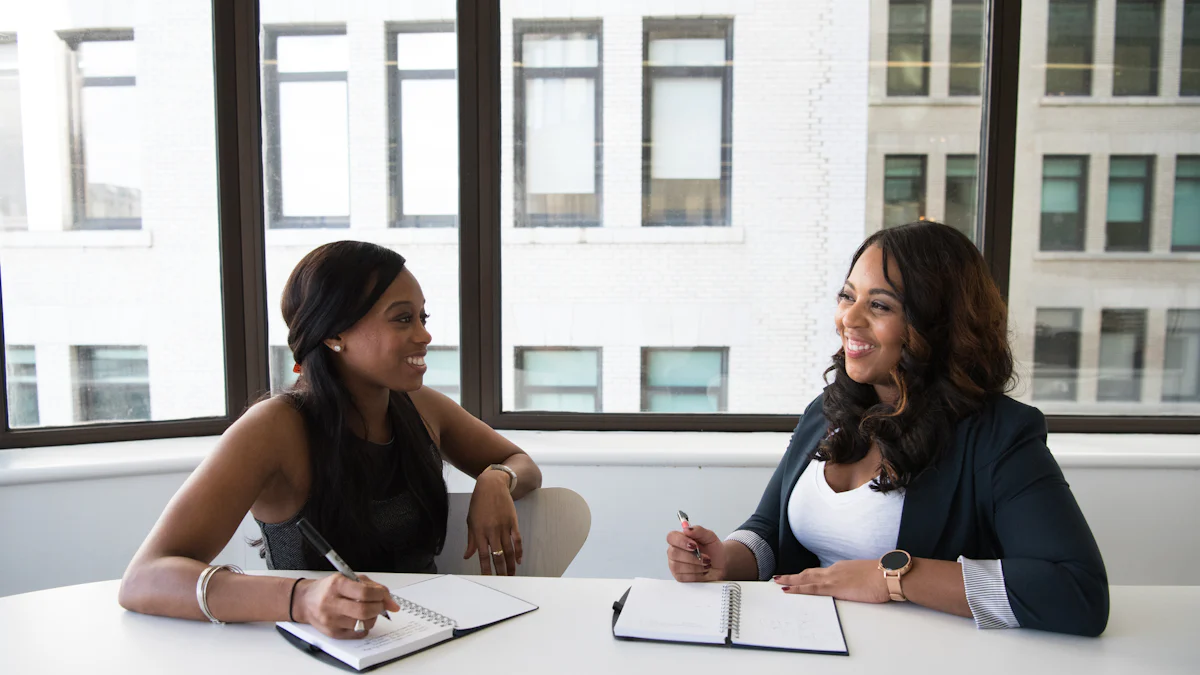Top Tips to Ace Your Internship Interview
Try Aihirely for
Smarter Interview Prep
Experience real-time AI support tailored to your Resume.
Boost your confidence and ace every question with
AI Mock Interview.

Image Source: pexels
Preparing for an internship interview can make all the difference. When you take time to get ready, you reduce stress and feel more confident. This calm mindset helps you focus and show your true personality. Plus, knowing what to expect, like common internship interview questions, lets you highlight your strengths. Preparation isn’t just about impressing others—it’s about giving yourself the best chance to succeed.
Key Takeaways
-
Learn about the company and job to match your answers.
-
Practice usual interview questions and use STAR to organize replies.
-
Wear neat clothes and speak clearly to leave a good impression.
Research and Preparation

Image Source: pexels
Understand the Company
Before your interview, take time to learn about the company. Start by understanding its mission, values, and culture. This helps you align your answers with what the company stands for. Dive into their products or services and figure out who their target audience is. Knowing this shows you’ve done your homework and care about the role.
Stay updated on recent news about the company. Have they launched a new product? Won an award? Mentioning these during your interview can make you stand out. You can also research their competitors and market position. This gives you a broader view of the industry and shows you’re serious about contributing to their success.
If you want to go the extra mile, check out their financial filings or earnings calls. These can give you insights into their priorities and challenges. Talking to someone who works there can also help you get an insider’s perspective.
Learn About the Role
Understanding the role is just as important as knowing the company. Read the job description carefully. Highlight the skills and qualifications they’re looking for. Think about how your experiences match those requirements.
If the description is vague, don’t worry. Look up similar roles online to get a better idea of what’s expected. You can also prepare a few questions about the role to ask during the interview. This shows you’re genuinely interested and eager to learn more.
Research the Interviewer (if applicable)
If you know who will interview you, take a few minutes to research them. Check out their LinkedIn profile to learn about their role in the company and their professional background. This can help you find common ground or topics to discuss.
For example, if they’ve worked on a project you admire, mention it during the interview. It’s a great way to build rapport and show you’ve done your research. Just remember to keep it professional—don’t dive too deep into their personal life.
Preparing for Internship Interview Questions
Practice Common Questions
One of the best ways to prepare for internship interview questions is by practicing common ones. Many interviewers ask similar questions across industries, so getting familiar with them can give you a big advantage. Here are some examples you might encounter:
-
Tell me about yourself.
-
What skills will you bring to the company?
-
Why do you think you’re qualified for this position?
-
How do others describe you?
-
How do you prioritize your workload?
Take time to think about your answers. Write them down and practice saying them out loud. This helps you sound natural and confident during the interview. Don’t memorize your responses word-for-word, though. Instead, focus on key points you want to highlight.
Master Behavioral Questions Using the STAR Method
Behavioral questions can feel tricky, but the STAR method makes them easier to handle. This technique helps you structure your answers clearly and effectively. Here’s how it works:
-
Situation: Describe the context or background of your story.
-
Task: Explain the challenge or responsibility you faced.
-
Action: Share the steps you took to address the situation.
-
Result: Highlight the outcome and what you achieved.
For example, if asked, “Tell me about a time you overcame a challenge,” you could use STAR to explain how you solved a problem during a group project. This method keeps your answer focused and shows your problem-solving skills.
Conduct Mock Interviews
Mock interviews are a fantastic way to prepare. Ask a friend, family member, or mentor to play the role of the interviewer. Provide them with a list of internship interview questions to ask, and treat the session like a real interview.
Mock interviews help you practice answering questions under pressure. They also give you a chance to work on your body language, tone, and pacing. Afterward, ask for feedback. What did you do well? What could you improve? Use this feedback to refine your approach and build confidence.
Tip: Record your mock interviews. Watching them can help you spot areas for improvement that you might not notice otherwise.
Presentation and Professionalism

Image Source: pexels
Dress for Success
Your appearance speaks volumes before you even say a word. Dressing professionally shows you’re serious about the opportunity. For internship interviews, a two-piece matched suit is always a safe bet. If you’re wearing a skirt, make sure it covers your thighs when seated. Stick to solid colors or subtle patterns for your blouse or dress shirt.
Here are a few more tips to help you nail your look:
-
Keep your shoes polished and professional. Closed-toe shoes with a low heel work well.
-
Avoid heavy perfumes, colognes, or body sprays.
-
Keep accessories simple and avoid anything too flashy.
-
Iron your clothes and ensure they’re wrinkle-free.
-
Pay attention to personal hygiene—bathe, use deodorant, and trim facial hair if needed.
Don’t forget to turn off your phone before the interview. A ringing phone can ruin the professional impression you’ve worked so hard to create.
Organize Your Materials
Being prepared with the right materials shows you’re detail-oriented and ready to impress. Bring a folder with multiple copies of your resume and cover letter. If you have other relevant documents, like a portfolio or reference letters, include those too.
Carry a notepad and pen to take notes during the interview. This shows you’re engaged and interested in what the interviewer has to say. A professional bag or portfolio can help you keep everything organized and make you look polished.
Highlight Your Soft Skills
Your technical skills matter, but soft skills can set you apart. Employers value qualities like communication, teamwork, and adaptability. During the interview, find ways to showcase these traits. For example, when answering questions, mention times you collaborated with others or solved problems creatively.
Body language also plays a big role. Sit up straight, maintain eye contact, and smile when appropriate. These small actions show confidence and enthusiasm. Remember, your attitude can leave a lasting impression, so let your personality shine through!
During the Interview
Communicate Clearly and Confidently
Your communication style can make or break your interview. Start strong by greeting your interviewer with a firm handshake and a confident smile. Speak clearly and avoid using slang or filler words like “um” or “like.” These small adjustments show professionalism and help you come across as polished.
Body language matters too. Sit up straight, maintain eye contact, and nod occasionally to show you’re engaged. If you’ve prepared stories using the STAR method, now’s the time to use them. These structured responses help you explain your experiences in a way that’s easy to follow.
Here’s a quick checklist to keep in mind:
-
Dress professionally to boost your confidence.
-
Avoid crossing your arms, as it can seem defensive.
-
Keep your answers concise and to the point.
Remember, confidence isn’t about being perfect. It’s about showing you’re prepared and ready to give your best.
Show Enthusiasm and Authenticity
Employers want to see your excitement about the role. Show genuine interest by asking about the company’s future projects or team dynamics. Share your achievements, but keep them relevant to the role. For example, if you’ve led a successful group project, explain how that experience prepared you for this internship.
Here’s a quick comparison to help you strike the right balance:
| Effective Techniques | Excessive Enthusiasm |
|---|---|
| Ask about team dynamics | Inquire about personal achievements too often |
| Share relevant achievements related to the role | Boast about every success in detail |
| Express interest in future company projects | Press for immediate hiring decisions |
Stay authentic. Don’t try to be someone you’re not. Employers appreciate honesty and can tell when you’re being genuine.
Ask Thoughtful Questions
Asking questions shows you’re curious and invested in the opportunity. Avoid generic questions and focus on ones that help you learn more about the role and company. For example, you could ask:
-
How do you measure success for this internship?
-
What’s been your most memorable experience at this company?
These questions not only help you understand the position better but also leave a positive impression on the interviewer. If you’re unsure what to ask, think about what excites you most about the role. Use that as a starting point to craft meaningful questions.
Tip: Avoid asking about salary or benefits during the interview. Save those for later stages of the hiring process.
Post-Interview Follow-Up
Send a Thank-You Note
A thank-you note might seem small, but it can leave a big impression. It shows you’re polite, professional, and genuinely interested in the role. Here’s how to craft an effective one:
-
Start by actually saying “thank you” for the opportunity to interview.
-
Keep it short—three paragraphs with 2-3 sentences each is perfect.
-
Personalize it. Mention something specific from your conversation to make it unique.
-
Be yourself, but stay professional. Let your personality shine through.
-
Choose the right medium. Email works well, but a handwritten note or LinkedIn message can stand out.
Tip: Send your note within 24 hours of the interview. It keeps you fresh in the interviewer’s mind and shows you’re prompt.
Reflect on Your Performance
After the interview, take a moment to think about how it went. Reflection helps you grow and prepare for future opportunities. Here’s what you can gain:
-
You’ll learn what you did well and where you can improve.
-
Even if you didn’t get the role, feedback can boost your confidence and keep you motivated.
-
It can help you refine your career goals and decide if the role aligns with your aspirations.
Ask yourself questions like: Did I answer questions clearly? Did I highlight my strengths? What could I do differently next time? Writing down your thoughts can make this process even more effective.
Plan for Future Improvement
Use what you’ve learned to create a plan for your next interview. If you struggled with certain questions, practice them more. If your body language felt off, work on sitting confidently and maintaining eye contact.
Note: Growth doesn’t happen overnight. Each interview is a chance to improve, so don’t be too hard on yourself.
Set small, actionable goals. For example, aim to ask better questions or give more concise answers. Over time, these adjustments will make you a stronger candidate.
You’ve got this! Remember these key takeaways:
-
Research the company and role thoroughly.
-
Practice answering questions confidently.
-
Show professionalism and enthusiasm.
Be yourself during the interview. Authenticity reduces stress and helps you assess if the company fits your values. Treat every interview as a chance to grow. Each step brings you closer to success!
FAQ
What should I do if I don’t know the answer to a question?
Stay calm and honest. Say, “I’m not sure, but I’d love to learn more about that.” This shows curiosity and a willingness to grow.
How early should I arrive for my interview?
Arrive 10-15 minutes early. This gives you time to settle in and shows punctuality. Avoid arriving too early, as it might make the interviewer feel rushed.
Can I bring notes to the interview?
Yes, bringing notes is fine! Use them as a reference, but don’t rely on them too much. Focus on maintaining eye contact and engaging in the conversation.
Tip: Keep your notes organized and professional. A small notebook or portfolio works best.
